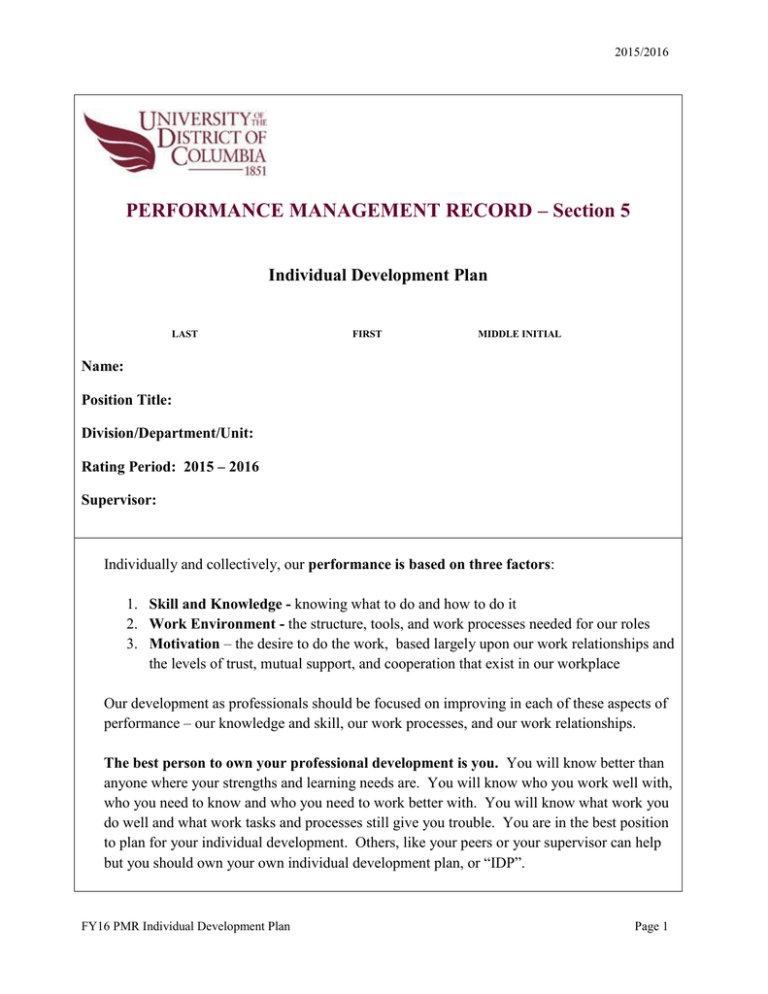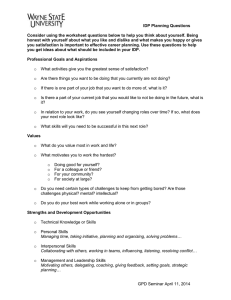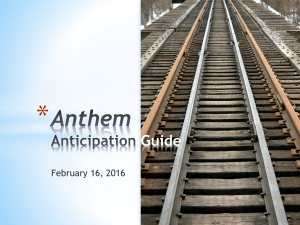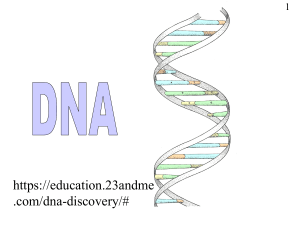PERFORMANCE MANAGEMENT RECORD – Section 5 Individual Development Plan
advertisement

2015/2016 PERFORMANCE MANAGEMENT RECORD – Section 5 Individual Development Plan LAST FIRST MIDDLE INITIAL Name: Position Title: Division/Department/Unit: Rating Period: 2015 – 2016 Supervisor: Individually and collectively, our performance is based on three factors: 1. Skill and Knowledge - knowing what to do and how to do it 2. Work Environment - the structure, tools, and work processes needed for our roles 3. Motivation – the desire to do the work, based largely upon our work relationships and the levels of trust, mutual support, and cooperation that exist in our workplace Our development as professionals should be focused on improving in each of these aspects of performance – our knowledge and skill, our work processes, and our work relationships. The best person to own your professional development is you. You will know better than anyone where your strengths and learning needs are. You will know who you work well with, who you need to know and who you need to work better with. You will know what work you do well and what work tasks and processes still give you trouble. You are in the best position to plan for your individual development. Others, like your peers or your supervisor can help but you should own your own individual development plan, or “IDP”. FY16 PMR Individual Development Plan Page 1 2015/2016 Individual Development Planning at UDC Individual development planning is a four step cycle: 1. A self assessment based on your duties and tasks 2. The decisions you will make in response to your assessment 3. The actions you will take as you follow your plan 4. The reflection and learning you will do as you act and again after you act This particular UDC IDP is your plan to design and redesign over time. Your IDP will be ongoing, a work in progress, a perpetual draft for you to use throughout your career at UDC, focused on and for the sole purpose of ensuring your success. There is no other tool like it. Your IDP is yours to design and redesign again and again over time. Individual Development Planning Exercise: Answer the questions on page 3. Record your answers in a way that you prefer so that you can refer to them again later. This is for your use. You won’t have to share your answers with anyone unless you choose to on your own. Skill and Knowledge can be improved through study, experimentation and repetition. The Work Environment can be improved through collaborative process improvement activities. Work relationships can be improved by creating rapport, providing support, and building trust. What action will you take? As you make your plans write them down and keep track of them, along with notes about the outcomes you experience. In this way you are keeping track of not only your effort but also your accomplishments. This information can be useful again and again over time and in many different ways, at work and beyond. The activities you engage in to improve performance are like experiments that you run in your own professional development laboratory. One experiment will usually lead to another as you learn about and practice your way to accomplishing your goals. It is our hope, that you make this simple exercise a part of your ongoing routine. The best of luck to you… FY16 PMR Individual Development Plan Page 2 2015/2016 PMR Individual Development Plan Self Assessment Learning Needs, Interests, and Goals List Skill and Knowledge Needs – Technical, Functional, and / or Leadership What do you need to know, or know how to do to increase your effectiveness and potential? What work skills or knowledge do you need to acquire to meet the needs of your students, clients, customers, or co-workers, or simply to keep up with changes in your field? Work environment – Systems, Tools, Work Processes, and Technology What needs to be done to improve the structure, tools, and/or processes you use and your customers use to do your work? Which tasks do you still need to learn, which tasks or work processes still give you trouble, and which ones give you the most satisfaction? Work relationships – Superiors, Subordinates, Peers, and Stakeholders Within your network of co-workers and clients, who do you work very well with, who do you still need to meet, and who do you need to work more effectively with? Which work relationships are hindering performance and need improvement based on mutual trust and support? FY16 PMR Individual Development Plan Page 3



